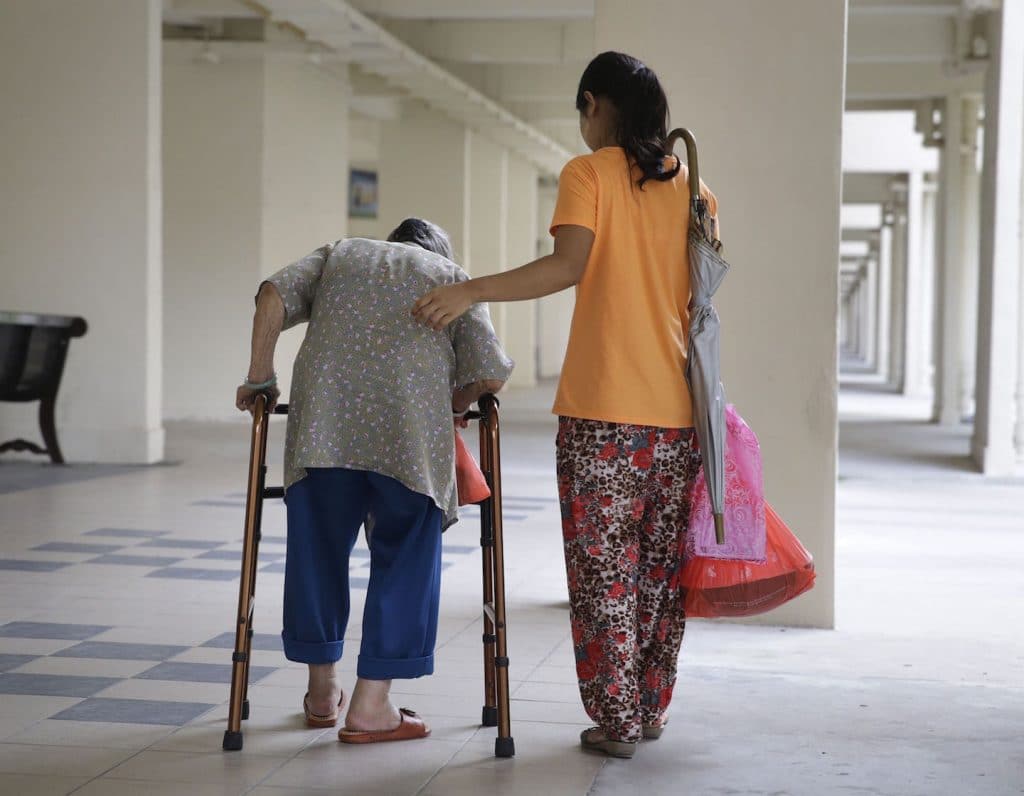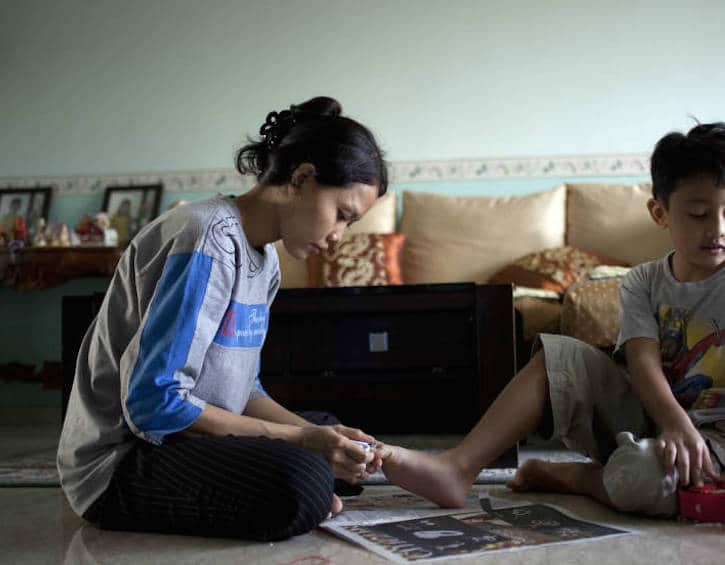
Do you suspect a domestic helper is being overworked, underfed, not paid, or even abused? Here’s expert advice on the steps you can take to help her
In this ongoing series on foreign domestic workers’ rights, Karien van Ditzhuijzen from HOME talks us through important aspects of hiring, managing and looking after your helper. Today, her tips on how you can assist other helpers you suspect are being abused or denied their basic rights.
It’s an all-too-common post we see on Facebook:
“My [neighbour’s helper/helper’s friend/helper’s relative] would like to transfer but her employer refuses. They [don’t let her leave the house/don’t give her sufficient food/haven’t paid her wages/all of the above].”
It can be heartbreaking to witness these circumstances, particularly when it seems like helpers pay the ultimate price of being repatriated simply for standing up for their rights.
Of course it is great to help someone in need, but before you sweep to the rescue, please do prepare yourself. There are a number of things to consider — you won’t want to make things worse for her with any rash actions. It is better to support the domestic worker in helping herself than to take direct measures. The main exception to this is situations where she is not able to do so, for instance when she is kept inside the house without any access to a telephone.

Get to know her
The first thing to do is simply talk to the helper, and let her know you are there for her. If she speaks limited English she might be comfortable speaking to another domestic worker from her own country.
The next step is to try and assess the situation – find out whether the domestic worker is unhappy. Keep in mind cultural differences, and also that this woman has likely sacrificed a lot to get this job. She might be hesitant to jeopardise it, so be mindful not to further aggravate her employer. When you talk to her, don’t give her false hope by claiming you will fix things. Stay calm, and tell her you will make enquiries to see what can be done.
You need to find out whether the employer has committed any offences. These can be criminal offences – like physical and sexual abuse – or violations of MOM’s work permit conditions. Gather as many facts as you can, particularly physical evidence:
If the domestic worker has a camera phone, ask her to take photos that can support her case: un-nutritious meals, chore schedules, salary overviews, physical marks on her body caused by the employer.
Audio or video recordings can help prove both verbal and physical abuse. If she has no phone, consider lending her one, or try to take some photos yourself. Gathering sufficient evidence can take time – but make sure not to expose her to a dangerous situation unless necessary.

Weigh her options
Whether to report any violations, or take any other action, should be her decision, as there will be consequences. Discuss the options with her, so she can make the best choice. Consequences could range from scolding and punishment from the employer, to losing her job and being repatriated.
If she does decide to report to MOM or the police, they will need to investigate, and there is likely to be a long wait time, during which the domestic worker cannot leave the country. It is not guaranteed she will be able to work during this time. Police cases for abuse particularly can take up to several years to be concluded. Without physical evidence they are unlikely to press charges.
How serious MOM takes infringements of work pass regulations varies. Taking away of passports and phones is usually condoned, while safety issues are acted on fast. General ill-treatment such as verbal abuse, malnourishment, exploitation and overwork is hard to prove. Without evidence, it will be the domestic worker’s word against that of the employer. Cases of non-payment of salary and illegal deployment are easier to prove, but again evidence is key. If in doubt, ask her to call the HOME helpline (1800 7977 977), as the staff there can assess individual situations and give direct advice.
If MOM decides that the employer has committed an offence, they can be fined or given a warning, and in extreme cases banned from hiring again. The domestic worker will usually be allowed to transfer to a new employer. However, if MOM rules that the employer did nothing wrong, the decision whether she can transfer will lie with the employer, which will most likely result in repatriation.

What else can you do?
When there are no clear violations, there are other options to get her away from the situation. To transfer to a new employer she would need to get permission from her employer. Tell her to ask for this nicely, and if necessary call her agent for help. If you know the employers you can also try reasoning with them directly. You can use your own network to find her a new job in order to avoid agency fees; with signed transfer papers a direct hire is easy to arrange directly with MOM.
If she gets repatriated, she can be re-hired from abroad. From most countries, like Indonesia, India and Myanmar, the new employer can still do this through direct hire. For domestic workers from the Philippines it is more complicated, as POEA regulations apply, which state that you need to have an agency to do the local paperwork in the Philippines. You can try to find an agent to do only that side of the process, and do the Singapore paperwork yourself.
If she would like return to her home country but the employers refuse to repatriate her, she can appeal to MOM; they will usually allow her to break the contract regardless of the reason and force the employer to buy the ticket.
Sometimes there is no easy solution and she may choose to remain with the employer. If she does so, respect her decision and remain her friend. There are many cases where just getting care and support from someone sympathetic is enough to feel better. You can advise her on ways to improve the relationship and communication with her employer, thus slowly improving her working conditions.

How can HOME help
HOME can help domestic workers with general advice, and support in lodging a complaint with MOM or the police. For criminal cases we offer legal assistance, both when the domestic worker is the victim and the accused. If the domestic worker decides to leave her employer, she can stay at the HOME shelter while the case is being investigated. The HOME shelter has educational programs, volunteer counsellors, a medical team, as well as volunteers that can assist in finding a new job. We have online support groups and Sunday drop-in helpdesks where domestic workers can ask for advice.
HOME helpline for Foreign Domestic Workers
(+65) 6341 5535 (office hours)
1800 7977 977 (toll-free 24 hour hotline)
Sunday drop-in Helpdesks (10 to 6 pm)
Myanmar Domestic Workers: 111 North Bridge Road, Peninsula Plaza #05-42, Singapore 179098
Indonesian Domestic Workers: 511 Guillemard Road, Grandlink Square #01-06, Singapore 399849
Filipino Domestic Workers: 304 Orchard Road, Lucky Plaza #06-22, Singapore 238863
Read More:
FDW Series: Know Your Rights and Obligations as an Employer
Why Your Helper Should NOT Be Part of the Family
Myths and Facts about the Helper Security Bond






 View All
View All





 View All
View All









 View All
View All




![[𝗦𝗔𝗩𝗘 𝗧𝗛𝗜𝗦] 𝗙𝗿𝗲𝗲 𝗔𝗰𝘁𝗶𝘃𝗶𝘁𝘆 𝗙𝗼𝗿 𝗞𝗶𝗱𝘀 𝗪𝗵𝗼 𝗟𝗢𝗩𝗘 𝗙𝗶𝗿𝗲𝘁𝗿𝘂𝗰𝗸𝘀! 🚒🔥
Skip the usual mall stroll and check out the Civil Defence Heritage Gallery! It’s free, air-conditioned, and housed in Singapore’s very first fire station, just across from Funan Mall.
Spanning two full floors, the gallery dives into Singapore’s firefighting history, major rescue missions, and the evolution of the SCDF. There are interactive exhibits, immersive displays, and even emergency preparedness tips for the public.
Bonus: Selected fire stations also host Saturday morning open houses with guided tours where you can watch fire gear demos, meet firefighters, and see those high-pressure water sprays in action!
𝗛𝗼𝘄 𝗺𝘂𝗰𝗵? FREE
𝗪𝗵𝗲𝗿𝗲? 62 Hill St, Singapore 179367
𝗢𝗽𝗲𝗻𝗶𝗻𝗴 𝗵𝗼𝘂𝗿𝘀? 10 am–5 pm (Closed on Mondays)
Comment “Fire” or link in bio for more details!
Tag your parent crew and plan your next adventure with the little ones! 👨👩👧👦💥
.
.
.
.
.
.
.
#SGFireStation #SCDFGallery #ThingsToDoWithKidsSG #FreeFamilyFun #SGParents #KidFriendlySG #FiretruckLovers #MuseumAdventure #SCDF #HeritageGallery #SGMums #FamilyWeekendSG #LearningThroughPlay #SingaporeWithKids](https://www.sassymamasg.com/wp-content/plugins/instagram-feed/img/placeholder.png)
